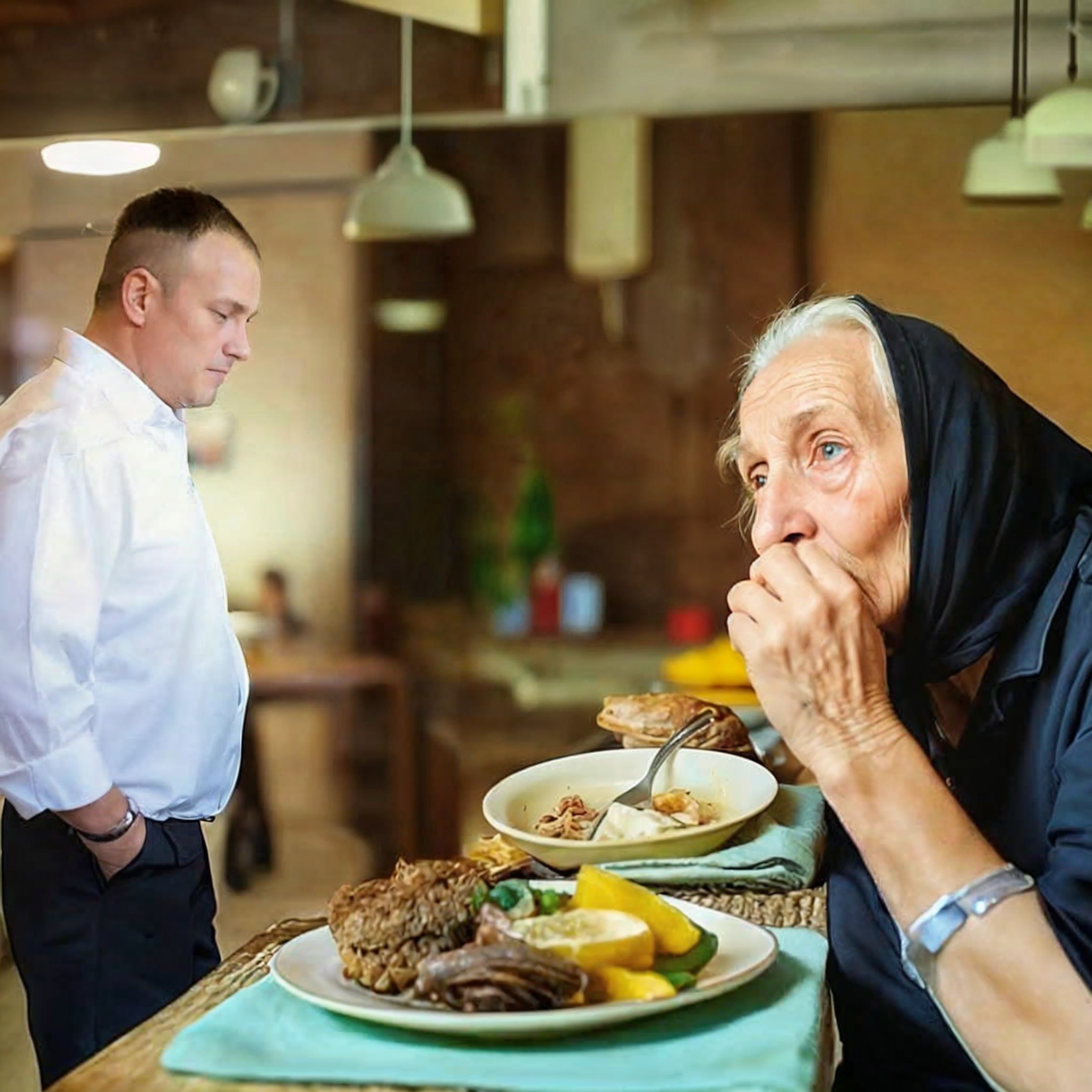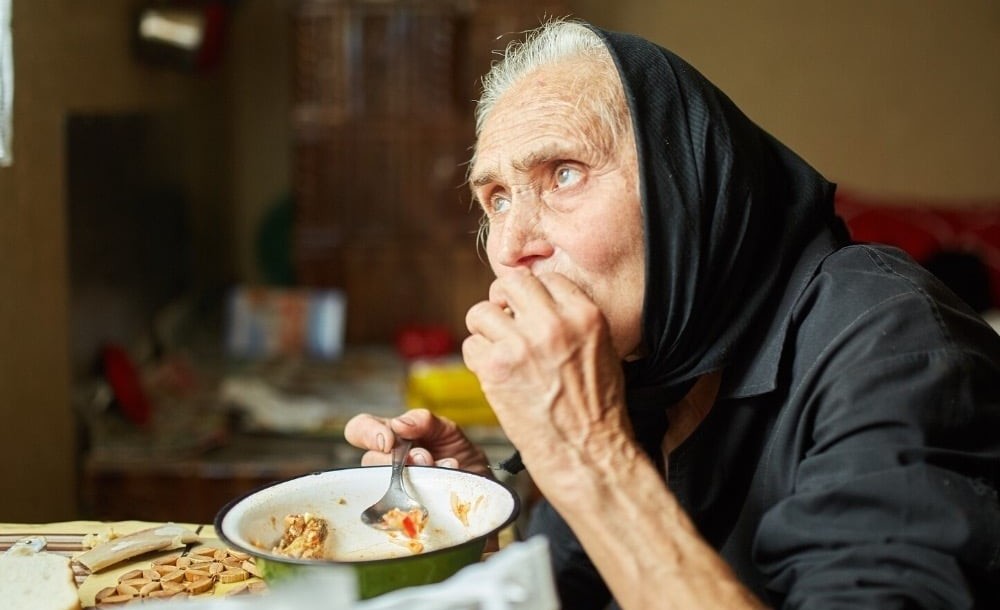The Words That Transformed: How a Homeless Woman Changed a Restaurant Owner’s Life
Vyacheslav leaned back in his plush office chair, his lips curling into a satisfied smile. His restaurant, the jewel of the city, was flourishing. Known for its elegant ambiance and exquisite cuisine, it had garnered accolades far and wide. Reflecting on his journey, Vyacheslav marveled at how far he had come—from the chaotic 1990s, when every decision felt like a gamble, to owning one of the most prestigious establishments in town.

Much of his success, he believed, was owed to his late grandfather, Leonid Makarovich. In his final years, Leonid had sold the family’s cherished dacha to provide his grandson with the funds to pursue his dream. “You’ve got a spark for business,” Leonid had said, handing over the money. That investment became the seed for Vyacheslav’s first venture—a humble snack bar at the local market. From there, his business grew: a café at the train station, a modest bistro, and finally, the grand restaurant that now stood as a symbol of his achievements.
As he sat reminiscing, muffled voices outside his office caught his attention. Opening the door, he found two waitresses deep in conversation. “She’s back,” one of them muttered, irritation lacing her tone.

“Who’s back?” Vyacheslav asked, frowning.
“The old woman,” replied Vera, one of his most experienced staff. “She’s outside the window again, staring in at the guests. It’s unsettling.”
Vyacheslav walked over to the window and saw her—a frail, disheveled woman with tangled gray hair and tattered clothing. She stood outside, peering through the glass at the diners enjoying their meals. Her sunken eyes, sharp with longing, fixated on the plates of steaming food. He felt a flicker of irritation.
“Where’s the security guard?” he asked. “Why hasn’t he dealt with this?”
Maria, another waitress, chimed in. “He tried, but she keeps coming back. She doesn’t cause trouble, but… she makes the guests uncomfortable.”
Vyacheslav sighed. The last thing he wanted was for his upscale restaurant to be associated with a homeless woman loitering outside. He instructed the staff to call the police to remove her discreetly. When the officers arrived, they escorted her away without incident.
As Vyacheslav watched her leave, a fleeting pang of unease settled in his chest. Something about her frailty stirred memories of his grandmother, Anna, who had raised him after his parents’ deaths. His mother had disappeared when he was a child, and though his grandparents had tried to shield him from the truth, whispers of her tragic fate had haunted him for years.

Later that day, he overheard that Anya, a new cleaner, had been secretly feeding the old woman. Frustrated, he confronted her. “What are you doing?” he demanded, catching her in the act by the service entrance.
Anya flinched, holding a plate of food. “I’m sorry, sir,” she stammered. “She looked so hungry. I couldn’t ignore her.”
Vyacheslav’s temper flared. “Do you understand the kind of reputation this restaurant has? Acts of carelessness like this could ruin everything I’ve built.”
The old woman, sensing the tension, spoke up. “Please, don’t blame her. She was only being kind.”
Vyacheslav turned to her, his voice cold. “Kindness doesn’t pay the bills. Finish your food and don’t come back.”
The woman stood, trembling, and picked up the bread she had been eating. “Thank you,” she said softly to Anya. “Any trouble can be survived with bread.”
The words hit Vyacheslav like a bolt of lightning. His chest tightened as memories surged forward—his mother, kneeling beside him after a fall, offering him a piece of bread and whispering those very words: “Any trouble can be survived with bread.”
“Wait,” Vyacheslav called out, his voice cracking. “Where did you hear that?”
The old woman paused, her eyes narrowing in confusion. “It’s something my mother used to say. Why?”
“What’s your name?” he asked, his voice trembling.
“Lyubov Vasilyevna,” she replied.
Vyacheslav’s heart raced. The name unraveled a thread of memories he had long buried. “Please… come inside,” he said, his tone softening.
In his office, Vyacheslav asked her about her past. As she recounted a life of hardship—losing her husband, enduring imprisonment, and being separated from her son, Slavochka—the truth became undeniable.
“They took him from me,” she said, tears spilling down her cheeks. “I searched for years, but it was as if he vanished. I prayed he’d forgive me.”
Vyacheslav’s voice quivered as he whispered, “I’m Slavochka.”
Lyubov’s eyes widened, her hand flying to her mouth. “No… it can’t be. My Slavochka?”
He nodded, tears streaming down his face. “I thought you were gone. They told me you had died.”
Mother and son embraced, their tears washing away decades of pain. Vyacheslav vowed never to lose her again. He arranged for the best medical care and brought her into his home, where his wife and children welcomed her with open arms.
For Vyacheslav, the reunion was a profound reminder of life’s true treasures. While his restaurant symbolized his professional success, the rediscovery of his mother filled his heart with a joy no accolades could ever match. Lyubov Vasilyevna, once lost, was now the cornerstone of their family—a testament to love’s enduring power and the possibility of redemption.



